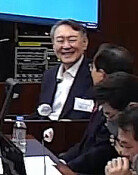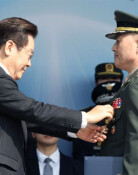WTO chief says Korea may seek exemption of rice tariffication
WTO chief says Korea may seek exemption of rice tariffication
Posted May. 17, 2014 06:40,
The head of the World Trade Organization (WTO) stressed the importance of prompt trade opening, with the grace period for expiry of Koreas rice market opening set to expire at years end.
At a press conference after a breakfast lecture hosted by the Institute for Global Economics on Friday, WTO Director-General Roberto Azevedo said that different member states have different sensitive trade items, but the key is how fast a country liberalizes trade, adding that it would be a difficult policy decision for Korea, but it is important to achieve trade liberalization in a method that is politically possible.
Since WTO member states are well aware that Korea considers rice a sensitive trade item, it is at Koreas discretion to ask other member states for understanding for the country to extend exemption of rice tariffication (market opening) further, he also said.
Following the conclusion of the 1994 Uruguay Round negotiations, 159 WTO member countries including Korea agreed to open their rice markets, but Korea remains exempt from opening of the rice market through the end of this year in return for importing a certain amount of rice from overseas. If Korea is to remain exempt from rice market opening beyond 2015, it should acquire consent from other WTO member countries, and if it is to extend the grace period, it will likely face significant side-effects, including significant expansion of obligatory rice import.
Recently, the Philippines requested exemption of rice market opening, but WTO member countries rejected. Against this backdrop, the Agriculture, Food and Rural Affairs Ministry will devise the governments measures by June, judging that opening rice market is inevitable. However, farmers organizations and others are continuously demanding the government to engage in negotiations to extend the grace period of rice tariffication.
On the criticism that the Korean government is intervening in the foreign exchange market, Azevedo said that implementing exchange rate policy according to situations is a matter to be determined by respective countries, which is the essence of the global economy. He went on to say that during his visit, he found that Korea is a country full of energy and innovation, adding that as a country that achieved economic miracle, Korea is hoped to play a central role in WTO talks for liberation of agro products, service, and manufactured goods, which will resume this year.
Receiving Azevedo Friday afternoon, President Park Geun-hye discussed outlook of Doha Round Agenda talks, and ways to strengthen Koreas cooperation with the global trade body, among other issues. Prior to his visit to the presidential office, Azevedo met with National Assembly Speaker Kang Chang-hee, Trade, Commerce and Energy Minister Yoon Sang-jik, and Agriculture, Food and Rural Affairs Minister Lee Dong-pil. He left for China on Friday to attend a trade ministers meeting of the Asia-Pacific Economic Cooperation.




![지하철 타고 가는 북한산성…외국인도 반한 ‘K등산 맛집’[전승훈 기자의 아트로드]](https://dimg.donga.com/c/138/175/90/1/wps/NEWS/IMAGE/2026/01/10/133120824.1.jpg)


